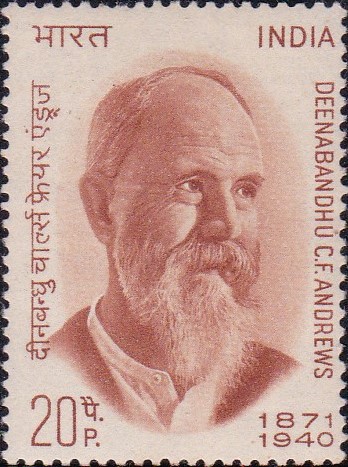
Charles Freer Andrews
A commemorative postage stamp on the Birth Centenary of Deenabandhu C.F. Andrews, a Church of England priest, christian missionary, educator and social reformer in India :

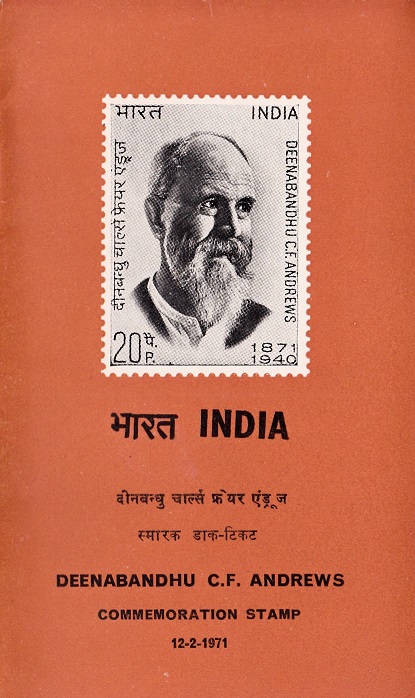 Issued by India
Issued by India
Issued on Feb 12, 1971
Issued for : The Posts and Telegraphs Department feels privileged to pay its homage to this great friend of India by issuing a special commemorative stamp on the occasion of his birth centenary.
Description of Design : The design of the stamp is vertical and depicts a portrait of Deenabandhu C. F. Andrews.
Type : Stamp, Mint Condition
Colour : Mineral Red
Denomination : 20 Paise
Overall Size : 3.91 X 2.90 cms.
Printing Size : 3.56 X 2.54 cms.
Perforation : 13 x 13
Watermark : Printed on unwatermarked Adhesive stamp paper
Number Printed : 30,00,000
Number per issue sheet : 35
Printing Process : Photogravure
Designed and Printed at : India Security Press
Name : Charles Freer Andrews
Born on Feb 12, 1871 at Brunel Terrace, Newcastle, Northumberland, England
Died on Apr 5, 1940 at Calcutta, India
About :
- Charles Freer Andrews, known affectionately to millions of Indians as ‘Deenabandhu Andrews‘ was a true Christian in every sense of the term and a great humanitarian. He loved India with such intense love that though born an Englishman, he completely identified himself with the people of India and made their sorrows and aspirations his own.
- C. F. Andrews was born in New-castle-on-Tyne on February 12, 1871. He grew in childhood in an atmosphere of prayer and meditation. The impact of Church service and the religious life of his parents helped his passionate devotion to religion, developed from the very early days of childhood. It was his father who instilled into him a thirst for knowledge. Andrews, a brilliant student of King Edward VI School stood first in Classical Ill at the age of fifteen. He could quote from memory long passages of Greek and Latin verses. Andrews was selected for a Classical Scholarship at Pembroke College, Cambridge. In 1893, he took a first class in classical Tripos, and obtained a Fellowship in 1899 and came to Cambridge to teach Theology.
- On March 20, 1904, Andrews came to India as a Christian missionary and joined the staff of St. Stephen’s College in Delhi. Soon he found his goal among the poor and oppressed people in India. He was shocked to find that untouchability and racial injustice were eating into the vitals of Indian life. Andrews felt the agony of the suffering Indians and realised the urgent need for India‘s independence, the desire for which was already ripe among the political leaders of the country then. He strongly supported Dadabhai Naoroji, who voiced for the first time India‘s claim for Swaraj in 1906. Deenabandhu Andrews met Rabindra Nath Tagore in England in 1912 at the house of William Rothenstein. The beauty of Tagore‘s poetry moved him and opened up new vistas before his mind. His meeting with Rabindra Nath Tagore further strengthened his kinship with India and he came to look upon Tagore as his Gurudeva.
- The conditions of Indians in South Africa who were deprived of social rights on the grounds of racial discrimination aggrieved him much. He was shocked to hear about the indentured labour system. When he went to Durban in January, 1914 with Gopal Krishna Gokhale, he met Mahatma Gandhi who was fighting for the rights of Indians. His sympathy for the Indians in Fiji was intensified when he read the book ‘The Fiji of Today‘. When Gokhale died, Andrews took up his unfinished work of redressing the distress of the Indians in Fiji. He worked very hard to bring an end to the heartless system of indenture, and this was finally accomplished on January 1, 1920. He was indeed a great friend of poor Indians in Fiji, who called him ‘Deenabandhu’ meaning the friend of the humble, in 1917. This title has stuck to him ever since.
- The distress of the poor Indian labourers led Andrews to work for their welfare. He was himself the leader of the newly formed labour union. He travelled untiringly from Assam to Ceylon to remove the sufferings of Indian workers. He was also a friend of the railwaymen and was the peace-maker on the occasion of the railway strike in March, 1921. He was twice elected as President of the All India Trade Union Congress.
- For the next 20 years, Deenabandhu was everywhere. He was in the Punjab after the terrible event of Jallianwala Bagh, asking forgiveness in person for wrongs and injustices committed by his own nation. He was many times in South Africa and Kenya, upholding the Indian honour and self-respect against insults and racial discrimination. Then many times, he was with Gandhiji, and always in Gandhiji‘s times of special need – in sickness, during the great fasts of self-purification, as at the Round Table Conference in London. His temporary home in India was Santiniketan. He along with W. W. Pearson worked in Santiniketan to share the burdens of Rabindra Nath Tagore. He loved Santiniketan as it was to him an abode of boundless peace.
- Mahatma Gandhi and Gurudev Tagore were the closest associates of Andrews. He was ‘Charlie‘ to both of them. He supported Gandhiji‘s campaign of non-violence. He loved and revered Gandhiji as he believed that the deliverance of the suffering people of India would come through him. He pleaded strongly for India‘s independence.
- Andrews devoted service to the poorest and lowliest was prompted by love. He was a true Christian and a humanitarian. In every action he took he felt that he was inspired by the spirit of the Lord Jesus Christ. When Andrews wrote his own life story, he called it, “What I Owe to Christ.” He always carried with him Christ‘s message of love. Charles Freer Andrews has been rightly called the Christ‘s Faithful Apostle. He died in Calcutta in 1940 in his 70th year.
- He was a real friend of India and made India his spiritual home. He lived and died for India.


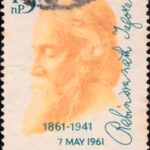
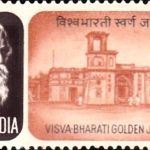
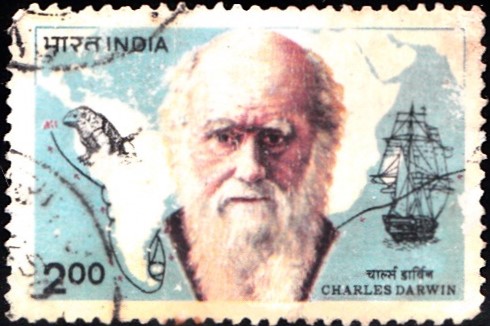

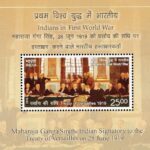
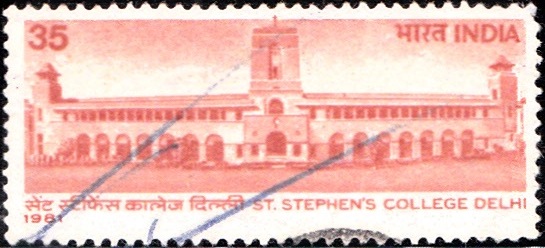
[…] has been fortunate to have, over the years, a succession of great men of character and vision. Deenabandhu Charles Andrews, member of the faculty, (1904-14), who founded the College Magazine “The Stephenian”, and the […]
[…] could not but take the foremost place wherever he might be“. This maker of modern India, as C. F. Andrews called him, had once observed: “Our highest ambition is to be buried in the foundations of a […]
[…] Rabindranath. It was about the year 1912 Rabindranath was fortunate in securing the services of C. F. Andrews and W. W. Pearson who came to Santiniketan to share his work. For a short time even […]